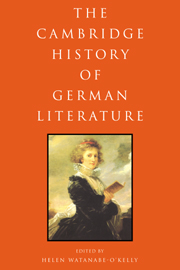Book contents
- Frontmatter
- 1 The Carolingian period and the early Middle Ages (750–1100)
- 2 The high and later Middle Ages (1100–1450)
- 3 The early modern period (1450–1720)
- 4 The German Enlightenment (1720–1790)
- 5 Aesthetic humanism (1790–1830)
- 6 Revolution, resignation, realism (1830–1890)
- 7 From Naturalism to National Socialism (1890–1945)
- 8 The literature of the German Democratic Republic (1945–1990)
- 9 German writing in the West (1945–1990)
- Select bibliography
- Index
- References
1 - The Carolingian period and the early Middle Ages (750–1100)
Published online by Cambridge University Press: 28 March 2008
- Frontmatter
- 1 The Carolingian period and the early Middle Ages (750–1100)
- 2 The high and later Middle Ages (1100–1450)
- 3 The early modern period (1450–1720)
- 4 The German Enlightenment (1720–1790)
- 5 Aesthetic humanism (1790–1830)
- 6 Revolution, resignation, realism (1830–1890)
- 7 From Naturalism to National Socialism (1890–1945)
- 8 The literature of the German Democratic Republic (1945–1990)
- 9 German writing in the West (1945–1990)
- Select bibliography
- Index
- References
Summary
The dominant language of written literature in Germany in the early Middle Ages is Latin. Only a very small amount of writing in German has survived from the reigns of Charlemagne and his successors (from the middle of the eighth century to the early tenth), of the Ottonian emperors (the tenth century) and even of the Salians (taking us through the eleventh century). Far from making the task of presenting German literature in its earliest stages easier, however, this causes difficulties which do not arise once a vernacular literary tradition has established itself. Not only are the definitions of ‘German’ and of ‘literature’ problematic, but the more important question arises of whether German literature at this stage may be defined exclusively as literature in German. Part of the interest in the period lies in the emergence, from the eighth century onwards, of a self-conscious written tradition in German within a Christian-Latin literary and intellectual context, but the fact remains that most of the written literature in Germany in the Carolingian period is Latin, whereas material in German is for the most part not literary at all. With what little there is in German, too, the unconsidered acceptance of the idea of ‘text’ is impossible. Most of the survivals in German before 1100 exist in unique manuscripts and were affected from the start by the inferior position of the language. One of the most interesting poems of the period, the Muspilli, dealing with the destruction of the world, is written in the margins and other spaces of a Latin manuscript, causing problems of sense, structure, ordering and sometimes of decipherment.
- Type
- Chapter
- Information
- The Cambridge History of German Literature , pp. 1 - 39Publisher: Cambridge University PressPrint publication year: 1997
References
- 1
- Cited by

